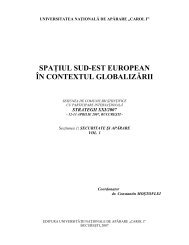Impact strategic nr.6-7 - Centrul de Studii Strategice de Apărare şi ...
Impact strategic nr.6-7 - Centrul de Studii Strategice de Apărare şi ...
Impact strategic nr.6-7 - Centrul de Studii Strategice de Apărare şi ...
- No tags were found...
You also want an ePaper? Increase the reach of your titles
YUMPU automatically turns print PDFs into web optimized ePapers that Google loves.
ACTUALITATEA POLITICO-MILITARĂ<br />
are those ones referring to: 1) Romania’s NATO membership.<br />
For achieving this status, Romania has a lot of<br />
obligations and responsibilities, as a state and as an army.<br />
There are necessary measures of mo<strong>de</strong>rnization of the<br />
army in or<strong>de</strong>r to become a compatible and interoperable<br />
army with the Alliance’s members ones. One of the main<br />
measures refers to the increase of the professionalization<br />
of the national armed forces, by updating the legal frame,<br />
by organizing, training and lea<strong>de</strong>rship in concordance with<br />
NATO’s standards, by increasing the number of professional<br />
soldiers. Actually, on missions NATO accomplishes<br />
around the world, all state members send just professional<br />
soldiers. As a result, Romania has to obey strictly this<br />
rule. We have sent military structures in Afghanistan, as<br />
an element of the multinational coalition fighting against<br />
the international terrorism, structures based exclusively on<br />
personnel recruited volunterely; 2) Romania’s admission,<br />
in the close future, in the European Union is another <strong>de</strong>termination<br />
leading to the professionalization of the army.<br />
Most members of this organization gave up conscription<br />
or are on the way of doing it, as a mean of recruiting a<br />
part of the military personnel. As a future member of the<br />
Union, Romania will have to recruit its personnel only by<br />
volunteer procedure if we want to align at the European<br />
standards and not to have major problems in this area.<br />
Becoming an EU member will bring both a lots of obligations<br />
and rights for the Romanian citizens. For instance,<br />
there will be a free circulation in EU space for the people.<br />
Therefore, any young Romanian person will may leave to<br />
work or to study in any European member country. From<br />
this perspective, there may appear a lot of disor<strong>de</strong>rs in<br />
finding the right persons for joining the army and their<br />
inner motivation to reply positively to this obligation; 3)<br />
the participation of some Romanian military structures to<br />
NATO missions. As a NATO member, our country will<br />
send abroad different military structures and soldiers to<br />
achieve specific missions. By <strong>de</strong>finition, on these missions<br />
there are admitted only professional soldiers because of:<br />
a) the high risk of these missions. The one participating<br />
to a NATO mission has to do it freely, not obliged by law;<br />
b) the need of a specialized military training of the one<br />
being a part of a NATO mission; c) the existence of some<br />
strict selection criteria for the soldiers involved in a NATO<br />
mission. The most important criteria is the volunteer in<br />
choosing the military profession; 4) the characteristics<br />
of the security environment, at regional, global level<br />
represent another important factor in professionalization<br />
of the army. After the end of East-West confrontation,<br />
the world states face risks and threats they must handle.<br />
Among these risks and threats we may mention: the<br />
uncontrolled spread of weapons of mass <strong>de</strong>struction. It<br />
is possible some countries and some terrorist groups to<br />
get this kind of weapons and use them on blackmailing<br />
other countries or their own objectives (as North Korea’s<br />
withdrawal from the Non-Proliferation Nuclear Weapons<br />
Treaty); the spread of organized crime networks (people,<br />
drugs, weapons smuggling); the aggression against some<br />
countries’ informational systems; the international terrorism;<br />
the <strong>de</strong>velopment of a cosmopolitan society, on<br />
one hand, and the i<strong>de</strong>ntity search, on the other hand, as<br />
a consequence of the <strong>de</strong>cline of the great i<strong>de</strong>ologies and<br />
the characteristics of the civilizations shocks. As a NATO<br />
member, Romania will have to involve actively in actions<br />
of preventing and diminishing the effects of some risks and<br />
threats. But efficiency <strong>de</strong>pends on the personnel quality; 5)<br />
the international treaties and conventions on reducing the<br />
forces and some weapon types. By signing them, Romania<br />
is obliged to reduce them to some extent. It is obvious these<br />
downsizings need to be compensated by high professional<br />
personnel and by mo<strong>de</strong>rn fight capabilities; 6) the reform<br />
in NATO’s member states. After the end of Cold War the<br />
risks and threats from the traditional enemy-members of<br />
the Warsaw Treaty- disappeared. Now we face stronger<br />
ones- the international terrorism, organized crime, illegal<br />
people smuggling, and uncontrolled spread of weapons of<br />
mass <strong>de</strong>struction. On the other hand, the need of aligning<br />
NATO’s objectives to the present European and worldwi<strong>de</strong><br />
political-military conditions, to the new types of missions<br />
this organization has assumed regionally and globally and<br />
to the effects of the technical-military revolution – all<br />
these facts have <strong>de</strong>termined the beginning of an ongoing<br />
reform in NATO’s members armies. The same reform has<br />
a strong impact on the similar process happening in the<br />
armies of the states invited to join NATO.<br />
3. Possible consequences of<br />
the professionalization of army<br />
The professionalization of the army has both sustainers<br />
and rivals because of its social, economical, political,<br />
military and psychosocial consequences. We present<br />
some of the possible and probable consequences: 1) the<br />
higher cost of a professionalized army comparing with<br />
those ones of a mass army. The specialists assert that<br />
on short run more money has to be spent for a professional<br />
army. On long run the costs become lower if we<br />
take into account: the increase of the functional period<br />
of time and high readiness of the fight technique that<br />
is handled, exploited and maintained by specialists and<br />
not by amateurs; the expenses necessary for equipping,<br />
feeding, hosting, the medical assistance of those ones<br />
performing the conscription may exceed the expenses<br />
for the volunteers; the periodical expenses for training<br />
the conscripts, in sum, are higher than the ones for the<br />
soldiers hied on a contract basis; 2) problems in assuring<br />
IMPACT STRATEGIC nr. 1-2/2003<br />
25



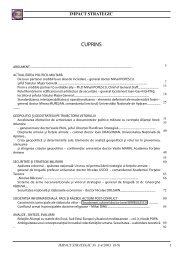

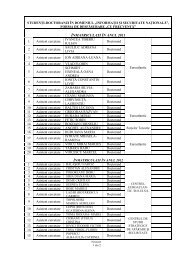
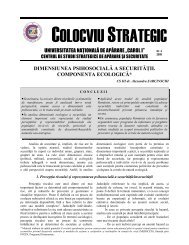
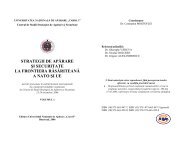
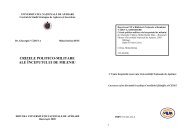


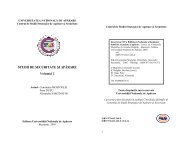
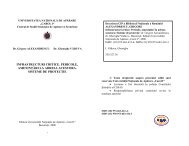
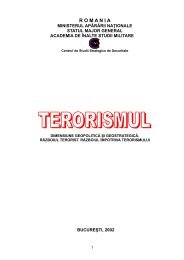
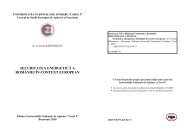
![„CAROL Nr 4 [29]/2008](https://img.yumpu.com/53801719/1/184x260/carol-nr-4-29-2008.jpg?quality=85)
